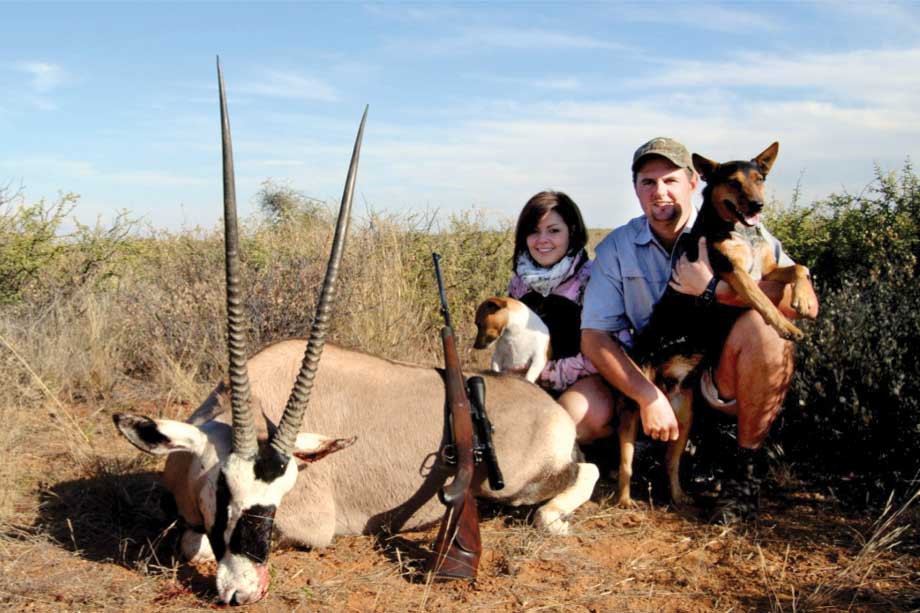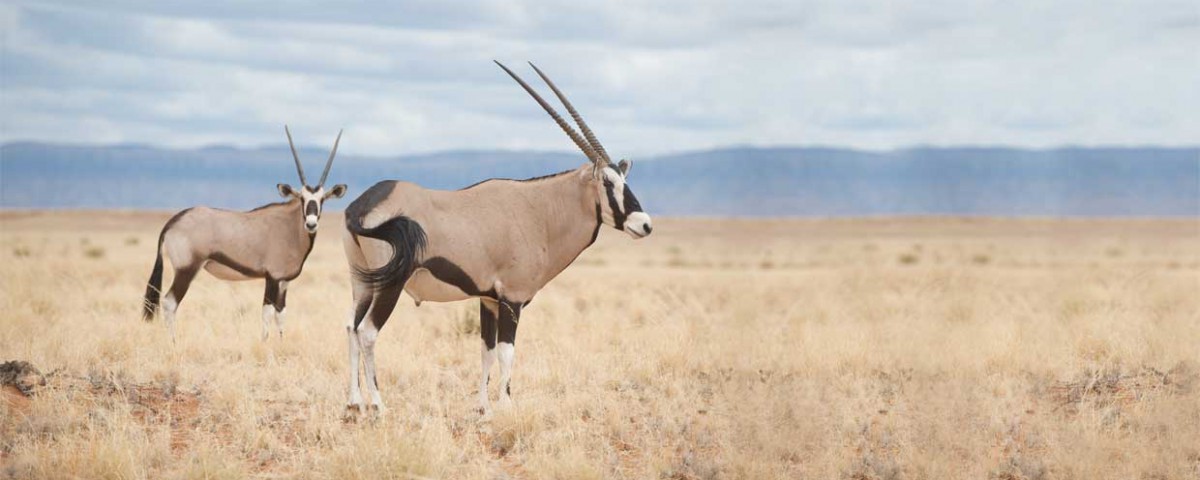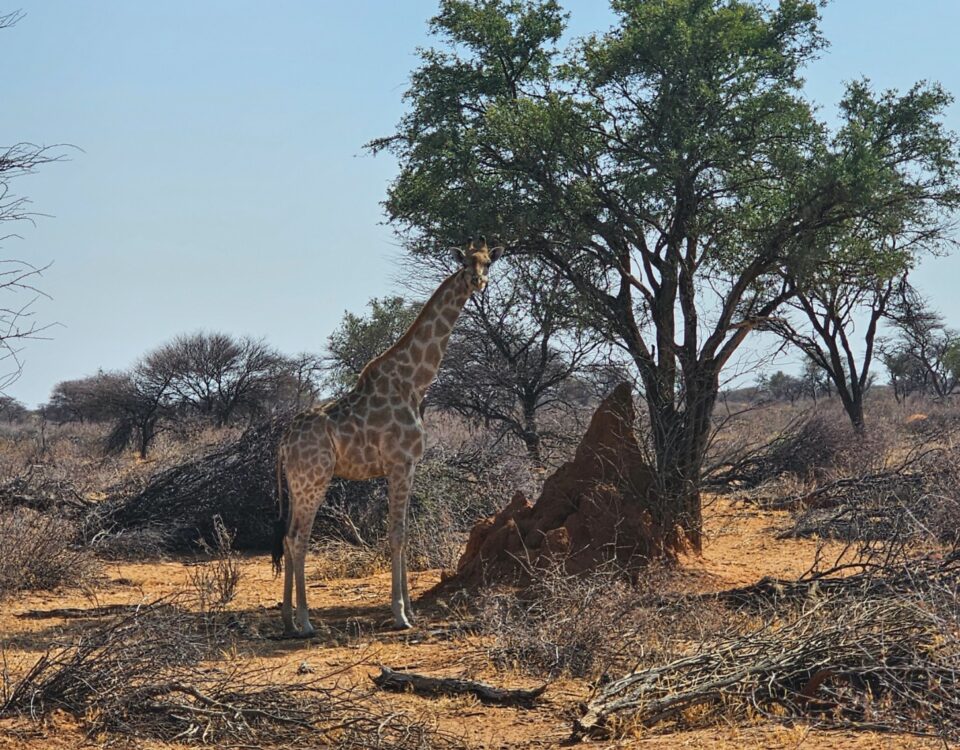Main photo ©Paul van Schalkwyk

Excitement all the way
April 19, 2016
Leopards and farmers
April 20, 2016F rom a culinary point of view it came as a bit of a shock for my parents when I visited one day and declared that I had turned vegetarian. I even tried to win them over to ‘vegan’ eating habits. I would launch into hours of philosophical deliberations on the reasons why everybody, if not vegan, should at least eat a vegetarian diet. I actually enrolled in vegan cooking classes. And if fish was served especially for me when everyone else had meat, I got really mad. “That is an animal, too! I won’t eat it.”
The biggest issue I battled with: the horrible practice of intensive animal farming. After passing my nursing exam and working for a year I wanted to make a dream come true and do an internship abroad. Since I love horses and have been riding for years, something with horses would be awesome I figured. I sent applications to various places all over the world. In the end I opted for an internship on a farm in Namibia. But only during the preparations for my trip I started to realise that it might be somewhat difficult to be a vegetarian on a farm. Tofu and soya didn’t seem to rank very high on Namibian menus. Wait and see.
Here I was, at the farm. In the dining room the trophies of an Oryx and a waterbuck greeted me. It was my first encounter with these species because I arrived after dark and hadn’t seen any animals on the way to the farm. Next, dinner was served. Oryx steak! Welcome to Namibia!
My scope of duties as an intern included the kitchen, which meant that I couldn’t avoid the ‘butchery’. It is a type of large walk-in fridge where venison is hung and stored with other perishable supplies. The farm not only provided eggs, milk and vegetables but also meat, ‘taken’ on a hunt. I won’t forget the queasy feeling I had when I entered the cold store for the first time. But I quickly learnt to lend a helping hand there, too.
The new experiences made me think, of course. I condemned intensive animal farming, it was my biggest issue. Here, however, we got eggs from free-ranging hens, milk from cows who were grazing on many hectares of land. All this seemed totally natural to me. I started to eat everything, including meat. But it wasn’t quite as easy as that. I asked myself how I could eat meat but judge those who kill the animal for you. After all I had part in it by eating the meat.
One day the farmer invited me to come along on a hunt. My godfather is a hunter and when I visited him he always invited me to join the hunt. Now I was sorry that I never had the guts to do so. I accepted the farmer’s invitation. We searched for three days before a kudu was bagged. I was surprised to find that hunting wasn’t all that bad, and we had worked really hard. After the hunt it was natural that I should take part in gutting and cutting up the meat, and I managed to do that, too. Dinner that evening seemed to be very different, but in a positive sense: the guilty conscience had disappeared from the back of my mind.
But one prejudice remained. Trophy hunting. I wondered why anyone should want to gun down these beautiful animals just for the sake of their horns. Then happened what had to happen: trophy hunters came for a visit. My joy at having them was rather limited but nevertheless I welcomed the guests and the hunting guide like a professional.
The hunting guide, who seemed very likeable, and I had the task to take care of the guests and prepare everything for the upcoming hunt. Already on the day of their arrival the gentlemen felt an urge to explore the hunting ground. I preferred to stay out of that. The hunters were successful during the next days and always came back exhausted. Sometimes, when an animal had been wounded, lunch had to be cancelled and even the guests had to clench their teeth until the subsequent search was successfully concluded.
One evening it was already quite late when the hunting guide, Divan Labuschagne, finally returned from the butchery. He was still wearing his bloodstained shirt, seemed tired but nevertheless happy and didn’t fit the bogeyman image of the ‘bad guy hunter’ at all. That evening we had our first discussion about trophy hunting. At that stage I still didn’t realise that trophy hunting isn’t just about the horns but about so much else as well, and that the meat is used. He got me interested. His passion for nature, wild animals and for hunting was almost tangible. He showed me lots of pictures and tried to help me to get a better understanding of trophy hunting. Looking back, that evening can probably pass as our first date.
From then on we spent a lot of time together. Occasionally I accompanied him to other parts of the country, and he introduced me to friends and family. I visited a taxidermy business for the first time, a place where trophies are prepared. You probably imagine it as somewhat creepy, the way you have seen it in movies. But it isn’t creepy at all. I was shown around together with the hunters who I had helped to take care of at the farm. It was interesting to see that with some of the animals they knew exactly how they wanted them mounted and prepared. Each animal had a story, each hunt had been an experience. The animal didn’t die anonymously and its meat fed the farm, including the workers.
The farmer actually donates meat and other foodstuffs to schools in the poorer areas and showed me photos. I started to gain insight into the circumstances and the practical use of trophy hunting. As a result of the possibility to utilise their game for hunting farmers tolerate wild animals, even the predators, next to their domestic animals. It is the exact opposite of intensive animal farming. Through hunting, habitats which otherwise would be lost for agricultural purposes are preserved for game. Income is generated for the country, the local population and nature conservation authorities and money is reinvested into nature and the protection of game. There are strict regulations for all of this and jobs are created in a country where unemployment is extremely high.
My life seemed upside-down. I decided to emigrate and get married. He is the one. First I had to return to Germany. My parents and close friends supported me 100%. But due to my new attitude towards hunting – the result of my own experiences – I also lost friends and even some members of the family reacted negatively. Mockery like ‘vegan hunter, lol!’ became commonplace, even though my stand on intensive animal farming hadn’t changed one bit. Well, what goes around comes around. Not so long ago I had been ranting and raving in a similar way. It is easy to draw the wrong conclusions when you are far away and do not know the circumstances. As for myself, I was battling with culinary problems again and the annoying guilty conscience at the back of my mind when I bought meat in ordinary supermarkets.

After five months in Germany I was on the plane again, on the way to the man of my dreams and the start of a new life. Since my registration as a nurse took several months we spent a lot of time in the wild. He was a strict teacher. First it was just ‘look and learn’. I quickly realised that hunting was not only about the size of the horns but about finding an old male past his prime. And that is not easy. To be hunted is part of an animal’s life from the day it is born, and these old blokes are well-versed in the battle for survival. On the hunter’s part this in turn requires a good knowledge about nature and the animal itself. Plus physical fitness.
I also learnt that you have to deal with ethical questions. A jackal, cheetah or lion certainly can’t be bothered, they are hungry and may even start to feed before the prey is really dead. A predator may kill a female kudu whose calf is hidden somewhere in the bush, left to a miserable death by starvation. That is nature’s way. One tends to forget that.
After a few weeks of daily lessons about theory and weaponry I was ready for my first hunt. With my husband as the hunting guide. Four days of stalking before firing the deadly shot. My first springbok. We had been searching the bush for the right one extensively. This one had been limping, we had several opportunities to shoot, but each time the wind changed or the buck stood behind cover. It is difficult to describe the emotions from the moment you spot an animal and decide to go for it until the moment you take aim, pull the trigger and see it go down. My springbok dropped to the ground immediately. Dead. On the one hand there is a feeling of joy about the successful hunt, the single deadly shot, the fact that the animal didn’t have to suffer. Then there is sadness about death, but there is also gratitude. I have adopted the ritual of kneeling down and giving thanks, paying my last respects, arranging the animal in a beautiful position before taking it away to gut the carcass and cut up the meat. My first springbok had a badly injured hindleg. The leg was black, part of it was already dead. The springbok had probably gotten into a poacher’s snare. Animals either die a woeful death in a snare or they get away injured and die as a result of those injuries.
Now that I had joined the ranks of hunters in practical terms as well, some personal relationships became difficult. It didn’t take long before I was called a killer. The reaction of people who were close to me was hurtful. I was still the same me, I loved animals and nature more than ever. I am still the one who reaches for tissues when watching a wildlife documentary and one of the animals dies. But nevertheless I am a hunter.
It is also hurtful to read and to hear of hunters being compared to poachers or even being called murderers. Instead of passing judgement from a distance you need to understand and really know the natural environment. I have met few people who are so much in sync with nature as those I know here. My husband’s family has nicknamed him ‘bushman’ because he literally thrives on being out in the bush.
With my husband I now live happily in Namibia. I work as a nurse in a small hospital, spending half of the month at the hospital and the other half on the farm. When I am on my way into town I already can’t wait to return home. An ecologically sound diet is important to us. We keep chickens, dairy cows and goats, we grow vegetables and we hunt. The chickens have free range of the farm, the cows, goats and horses enjoy many hectares of grazing. Personally, I can’t imagine anything better. And don’t forget, this is Africa, things are different here. As they say in Afrikaans: ‘Africa is not for sissis’.
This article was first published in the HUNTiNAMIBIA 2016 English edition.


